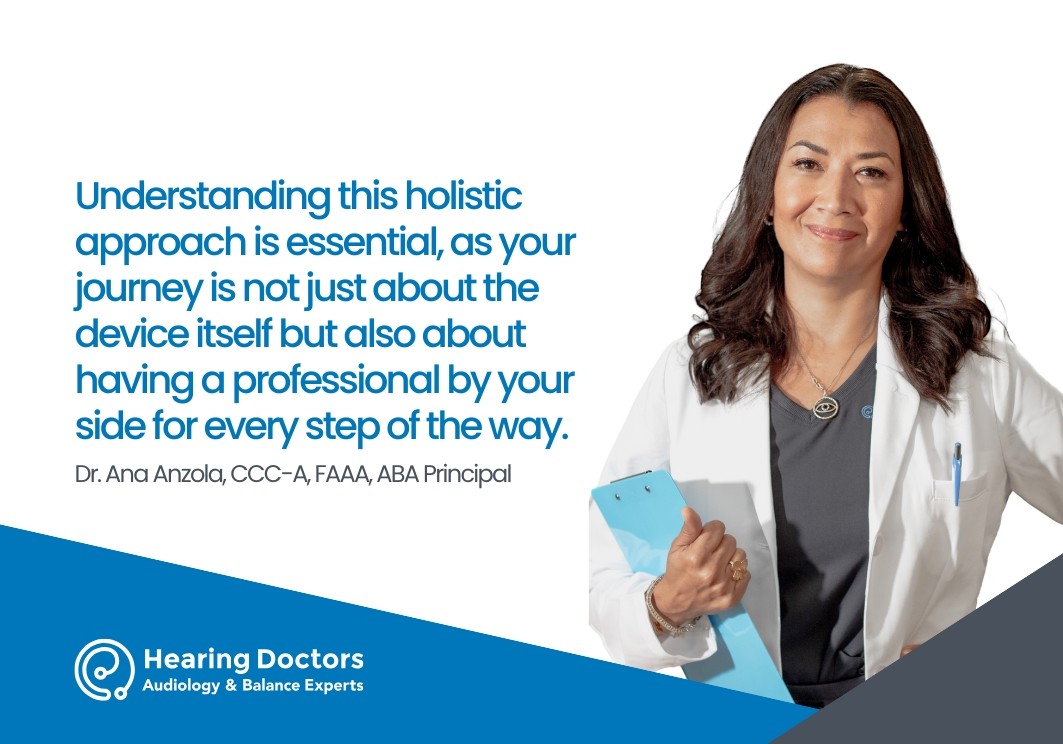Dr. Ana
Anzola, CCC-A, FAAA, ABA Principal
Earwax buildup is one of the primary causes of conductive hearing loss. When earwax accumulates excessively, it can create an ear canal blockage, preventing sound from being transmitted effectively to the inner ear.
Impacted earwax can lead to symptoms such as ear pain, muffled hearing, and a sensation of fullness in the ears. Addressing earwax buildup promptly is crucial to avoid long-term damage and maintain optimal hearing health.
Symptoms and Diagnosis of Conductive Hearing Loss
Understanding the symptoms of conductive hearing loss is essential for early intervention. Common conductive hearing loss symptoms include:
Muffled or diminished hearing
Ear pain or discomfort
A feeling of fullness or blockage in the ears
Unilateral conductive hearing loss (affecting one ear more than the other)
To diagnose conductive hearing loss, healthcare providers often perform a Weber test, which helps determine if the hearing loss is unilateral or bilateral. This test involves placing a tuning fork on the center of the head and asking the patient where the sound is heard best.
The Impact of Sound Transmission on Inner Ear Health
Conductive hearing loss affects the middle ear's ability to transmit sound to the inner ear. This transmission is vital because the inner ear converts sound into electrical signals that are sent to the brain for processing.
When sound transmission is blocked due to ear canal blockage or other causes, the sensory cells in the inner ear may not receive adequate stimulation, leading to potential long-term damage.
Early Treatment and Intervention for Conductive Hearing Loss
Conductive hearing loss treatment should be sought as soon as symptoms are noticed. Treatment options may include:
Removal of impacted earwax by a healthcare professional
Medications to treat ear infections
Surgical intervention for abnormal bone growths or other structural issues
Early intervention can prevent sound deprivation and protect the inner ear from permanent damage. Using the “good ear” to compensate for hearing loss in the affected ear is not a sustainable solution and may lead to further complications.
The Importance of Regular Hearing Assessments
Regular hearing assessments are essential to monitor ear health and detect any issues early. If you experience symptoms such as blocked ears, ear pain, or muffled hearing, it's important to seek medical advice promptly. An audiologist can perform tests to evaluate your hearing and recommend appropriate treatments to ensure sound transmission is not hindered and the inner ear remains healthy.
Popular Blogs

Jun 3, 2025
Dr. Ana
Anzola, CCC-A, FAAA, ABA Principal
Understanding Types of Hearing Loss: Sensorineural, Conductive, and Mixed

May 21, 2025
Dr. Ana
Anzola, CCC-A, FAAA, ABA Principal
What Impact Is Artificial Intelligence Having on Hearing Aid Technology?

Apr 28, 2025
Dr. Ana
Anzola, CCC-A, FAAA, ABA Principal
Do You Think You’re Too Young for Hearing Loss?

Apr 15, 2025
Dr. Ana
Anzola, CCC-A, FAAA, ABA Principal
The Best Hearing Aids in 2025: Insights From a Doctor of Audiology


